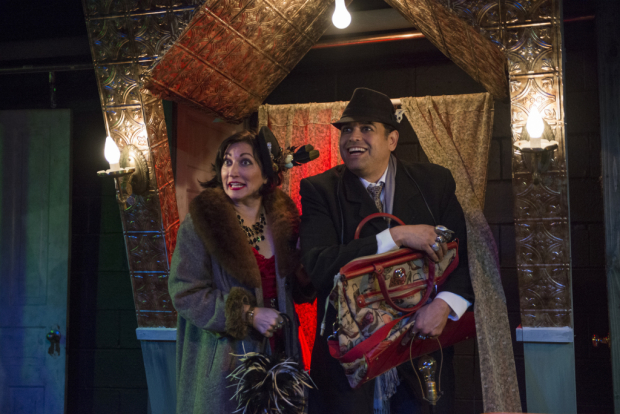The Room

(© Michael Brosilow)
A Red Orchid's production of Harold Pinter's The Room opens with something pleasant, authentic, and easy to identify — the sound and smell of bacon frying on the stove. Indeed, Rose (Kirsten Fitzgerald) is truly cooking up breakfast for Mr. Hudd (H.B. Ward, perfectly stoic), on a kitchenette that is just inches away from the audience.
Any sense of comfort that may be gained from this homey ritual, however, is erased by the unshakable silence between the two characters. When Rose finally speaks, she hardly stops. She chats about nothing, repeating herself to fill the void as Mr. Hudd silently ignores her. "It's murder outside," Rose frets, as she presses her husband to fill up on hot tea before leaving for the morning — or is it the evening? In The Room, nobody knows what time it is. "It'll be dark soon," Rose is told later in the play, "but not for a good while yet".
Fitzgerald, who is also the artistic director of A Red Orchid Theatre, plays Rose with a quiet, manic caution. Even a knock on the door is menacing to the tightly wound woman. Usually, the one knocking is the landlord, Mr. Kidd (Anish Jethmalani), who has ostensibly come in to check the pipes, but stays to reminisce about when the Hudds' bedsit used to be part of his family's grand estate. As Mr. Kidd, Jethmalani delivers some of Pinter's most absurd dialogue with an unsettling touch.
When both Mr. Kidd and Mr. Hudd have taken their leave, Rose is visited by Mr. and Mrs. Sands (Dano Duran and Mierka Girten), an odd couple who have, they say, come to enquire about a vacant room. The Sands circle Rose in her room like a pair of vultures, even rearranging her furniture. Costume designer Kotryna Hilko has covered the Sands in gaudy jewelry and buzzing patterns, in extreme contrast to the soft, simple costumes seen on Rose, Hudd, and Kidd. Between the costumes, Duran's sinister smile and Girten's cool, appraising stare, it's no wonder that Rose is so disturbed by the Sands.
The most frightening aspect of The Room may be Heath Hays' wonderfully tonal sound design. When Rose is alone, her actions cast an echo, allowing the audience a glimpse into her discordant mind, making Pinter's plentiful silence even more eerie. It is even more effective when paired with the dim, ever-shifting lighting design of Claire Chzran. Though characters call the titular room "cozy," Grant Sabin's set is full of peculiar details and unexpected angles, summoning further dread.
All of this unease comes to a crescendo when Rose receives her final visitor, the blind and mangled Riley (the ethereal Jo Jo Brown), who has been waiting for her in the dank basement below. Riley has a message for Rose: "Come home." Before the relationship between Riley and Rose can be clarified, however, Mr. Hudd comes home to the room, and the play ends with an explosion of brutality, thanks to director Dado's terse pacing and unrelenting violence design by B. Charlene Siefert.
Serious pieces of horror are rare in the theater, and while The Room does not strictly belong in the horror genre, A Red Orchid has firmly placed it there. Driven by Fitzgerald's palpable onstage fear, all of the elements come together to create a truly frightening play.











